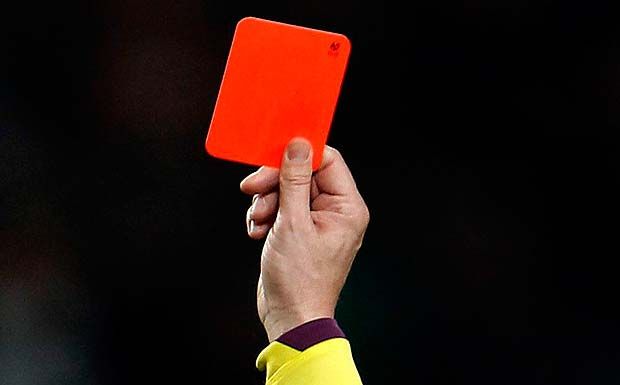
school of sport with TIM MIDDLETON
RED cards are quite common in professional sport, but there have been some bizarre examples in soccer.
The shortest time before a player was sent off has various contenders: Giuseppe Lorenzo of Bologna was sent off after 10 seconds in 1990 for hitting a Parma player.
Chippenham striker David Pratt was sent off for a reckless challenge three seconds into a game against Bashley, while Cross Farm Park Celtic striker Lee Todd was sent off for foul language just two seconds into a game in October 2000.
However, Sheffield United’s Keith Gillespie came on as a substitute during an English Premier League game against Reading in January 2007 and elbowed an opponent in the face before the game had even been restarted, thus technically being sent off before he had come on! Other strange facts about red cards include two team-mates (Kieran Dyer and Lee Bowyer) being dismissed for fighting each other and Dean Windass of Aberdeen picking up three red cards in one match in 2007.
In English non-league football a player called Watt was shown a red card for saying his own name, as the referee thought he was showing dissent and questioning his decision! Bizarre!
Sadly, an even more bizarre example has occurred twice recently at school sports matches, one at a first team senior school rugby match and the other, most disturbingly, at a Colts rugby match. At both events, spectators, probably parents, following different incidents, were clearly heard to shout out to the referee vehemently and viciously, “Send him off!”
Let us just remind ourselves: these were not international matches or professional sports matches, but school matches, and remember that the reason children are at school, including on the sports field, is for learning.
- Chamisa under fire over US$120K donation
- Mavhunga puts DeMbare into Chibuku quarterfinals
- Pension funds bet on Cabora Bassa oilfields
- Councils defy govt fire tender directive
Keep Reading
Yet parents shout out that they want a young child to be sent off the field, to be removed from the game, to be banned from the next two games (automatic suspension), to be dismissed from proceedings, presumably for the only reason that the parent’s own team can have a greater advantage and win.
We might well ask why the child should be sent off. It might simply be because the child does not understand the rules; but that is why they are at school, to learn rules. It might equally be because the child has not mastered the skills required; again, that is why they are at school, to learn skills.
They do not become masters of skills or indeed rules within a short time while it should also be remembered that the opposing players may be at a different standard and therefore contribute to the foul being committed, by moving in a way the other less experienced player did not anticipate.
It most likely can be explained by the fact that the child simply, honestly, made a mistake.
Yet here we have parents wanting a child, including one as young as nine years old, to be sent off.
If we pause for a moment and consider that if we were to use the same logic, then the same parent would want any child (including his own) to be sent out of class if he gives an incorrect answer; would want every child to be excluded from school for any offence; would want every school that failed to get every child through exams struck off the list of registered schools.
Clearly there is noroom for mistakes with such a spectator.
Even in the world of employment, there are levels of discipline with few actions warranting an immediate ‘sending-off’ or exclusion or dismissal, especially without a warning. Yet we still want young children to be sent off a sports field!
The fact is that while exclusion, which in effect is a sending off, may be severe, all it does is remove the problem from the field or school but it does not teach the lesson that people think it will.
Most often, the only thing the child learns is not to be caught doing it next time. A better action, taken by a true educationist, if it was a serious mistake, would be for the coach to substitute the child in order to explain what he had done wrong, why it was wrong and how to avoid it in the future.
Sadly, though, too many coaches at school are more concerned about the winning than the learning and so will simply leave it to the referee to take action (and probably complain about the decision, anyway).
Sending someone off a sports field is not a laughing matter, despite the bizarre examples at the beginning of this article. Sending a child off a sports field is even less a joke.
“Send him off”, is indeed an abrupt and absurd cry, but it is an equally immature and immaterial cry! The only person who should be sent off is the parent who has shouted out the cry. Send him off, sure, now, far away, until he learns why we play sport at school.
Tim Middleton is a former international hockey player and headmaster, currently serving as the executive director of the Association of Trust Schools. Email: [email protected]











